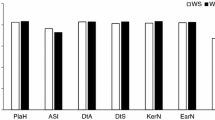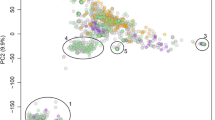Abstract
Drought stress is a serious agronomic problem resulting in significant yield losses globally. Breeding cultivars with drought tolerance is an important strategy that can be used to address this problem. Drought tolerance, however, is a complex multigenic trait, making advancements with conventional breeding approaches very challenging. This emphasizes the importance of dissecting the genetics of this trait and the identification and cloning of genes responsible for drought tolerance. With the rapid development of sequencing technologies and analytic methodologies, genome-wide association study (GWAS) has become an important tool for detecting natural variations underlying complex traits in crops. Identified loci can serve as targets for genomic selection or precise editing that enables the molecular design of new cultivars. This chapter describes the pipeline of statistical methods used in GWAS analysis, and covers field design, quality control, population structure control, association tests, and visualization of data. GWAS methodology used to dissect the genetic basis of drought tolerance is presented, and perspectives for optimizing the design and analysis of GWAS are discussed. The provided information serves as a valuable resource for researchers interested in GWAS technology.
Access this chapter
Tax calculation will be finalised at checkout
Purchases are for personal use only
Similar content being viewed by others
References
Gupta A, Rico-Medina A, Cano-Delgado AI (2020) The physiology of plant responses to drought. Science 368(6488):266–269. https://doi.org/10.1126/science.aaz7614
Levitt J (1980) Responses of plants to environmental stresses. Volume II. Water, radiation, salt, and other stresses. Academic Press, London. 607 p
Yoshida T, Mogami J, Yamaguchi-Shinozaki K (2014) ABA-dependent and ABA-independent signaling in response to osmotic stress in plants. Curr Opin Plant Biol 21:133–139. https://doi.org/10.1016/j.pbi.2014.07.009
Liu S, Qin F (2021) Genetic dissection of maize drought tolerance for trait improvement. Mol Breed 41(2):8. https://doi.org/10.1007/s11032-020-01194-w
Yu J, Buckler ES (2006) Genetic association map** and genome organization of maize. Curr Opin Biotechnol 17(2):155–160. https://doi.org/10.1016/j.copbio.2006.02.003
Huang X, Han B (2014) Natural variations and genome-wide association studies in crop plants. Annu Rev Plant Biol 65:531–551. https://doi.org/10.1146/annurev-arplant-050213-035715
Huang X, Zhao Y, Wei X et al (2011) Genome-wide association study of flowering time and grain yield traits in a worldwide collection of rice germplasm. Nat Genet 44(1):32–39. https://doi.org/10.1038/ng.1018
Jia G, Huang X, Zhi H et al (2013) A haplotype map of genomic variations and genome-wide association studies of agronomic traits in foxtail millet (Setaria italica). Nat Genet 45(8):957–961. https://doi.org/10.1038/ng.2673
Liu S, Wang X, Wang H et al (2013) Genome-wide analysis of ZmDREB genes and their association with natural variation in drought tolerance at seedling stage of Zea mays L. PLoS Genet 9(9):e1003790. https://doi.org/10.1371/journal.pgen.1003790
Wang X, Wang H, Liu S et al (2016) Genetic variation in ZmVPP1 contributes to drought tolerance in maize seedlings. Nat Genet 48(10):1233–1241. https://doi.org/10.1038/ng.3636
Li X, Guo Z, Lv Y et al (2017) Genetic control of the root system in rice under normal and drought stress conditions by genome-wide association study. PLoS Genet 13(7):e1006889. https://doi.org/10.1371/journal.pgen.1006889
Bhandari A, Sandhu N, Bartholome J et al (2020) Genome-Wide Association Study for yield and yield related traits under reproductive stage drought in a diverse indica-aus rice panel. Rice 13(1):53. https://doi.org/10.1186/s12284-020-00406-3
Huang X, Wei X, Sang T et al (2010) Genome-wide association studies of 14 agronomic traits in rice landraces. Nat Genet 42(11):961–967. https://doi.org/10.1038/ng.695
Chia JM, Song C, Bradbury PJ et al (2012) Maize HapMap2 identifies extant variation from a genome in flux. Nat Genet 44(7):803–807. https://doi.org/10.1038/ng.2313
Xu J, Chen G, Hermanson PJ et al (2019) Population-level analysis reveals the widespread occurrence and phenotypic consequence of DNA methylation variation not tagged by genetic variation in maize. Genome Biol 20(1):243. https://doi.org/10.1186/s13059-019-1859-0
Liu S, Li C, Wang H et al (2020) Map** regulatory variants controlling gene expression in drought response and tolerance in maize. Genome Biol 21(1):163. https://doi.org/10.1186/s13059-020-02069-1
Mao H, Wang H, Liu S et al (2015) A transposable element in a NAC gene is associated with drought tolerance in maize seedlings. Nat Commun 6:8326. https://doi.org/10.1038/ncomms9326
**ang Y, Sun X, Gao S et al (2017) Deletion of an endoplasmic reticulum stress response element in a ZmPP2C-A gene facilitates drought tolerance of maize seedlings. Mol Plant 10(3):456–469. https://doi.org/10.1016/j.molp.2016.10.003
Lu Y, Zhang S, Shah T et al (2010) Joint linkage-linkage disequilibrium map** is a powerful approach to detecting quantitative trait loci underlying drought tolerance in maize. Proc Natl Acad Sci U S A 107(45):19585–19590. https://doi.org/10.1073/pnas.1006105107
Xue Y, Warburton ML, Sawkins M et al (2013) Genome-wide association analysis for nine agronomic traits in maize under well-watered and water-stressed conditions. Theor Appl Genet 126(10):2587–2596. https://doi.org/10.1007/s00122-013-2158-x
Thirunavukkarasu N, Hossain F, Arora K et al (2014) Functional mechanisms of drought tolerance in subtropical maize (Zea mays L.) identified using genome-wide association map**. BMC Genomics 15(1):1182–1182. https://doi.org/10.1186/1471-2164-15-1182
Farfan ID, De La Fuente GN, Murray SC et al (2015) Genome wide association study for drought, aflatoxin resistance, and important agronomic traits of maize hybrids in the sub-tropics. PLoS One 10(2):e0117737. https://doi.org/10.1371/journal.pone.0117737
Pantaliao GF, Narciso M, Guimaraes C et al (2016) Genome wide association study (GWAS) for grain yield in rice cultivated under water deficit. Genetica 144(6):651–664. https://doi.org/10.1007/s10709-016-9932-z
Ma X, Feng F, Wei H et al (2016) Genome-Wide Association Study for plant height and grain yield in rice under contrasting moisture regimes. Front Plant Sci 7:1801. https://doi.org/10.3389/fpls.2016.01801
Li L, Mao X, Wang J et al (2019) Genetic dissection of drought and heat-responsive agronomic traits in wheat. Plant Cell Environ 42(9):2540–2553. https://doi.org/10.1111/pce.13577
Gahlaut V, Jaiswal V, Singh S et al (2019) Multi-locus genome wide association map** for yield and its contributing traits in hexaploid wheat under different water regimes. Sci Rep 9(1):19486. https://doi.org/10.1038/s41598-019-55520-0
Abou-Elwafa SF, Shehzad T (2021) Genetic diversity, GWAS and prediction for drought and terminal heat stress tolerance in bread wheat (Triticum aestivum L.). Genet Resour Crop Evol 68(2):711–728. https://doi.org/10.1007/s10722-020-01018-y
Pace J, Gardner C, Romay C et al (2015) Genome-wide association analysis of seedling root development in maize (Zea mays L.). BMC Genomics 16(1):47. https://doi.org/10.1186/s12864-015-1226-9
Phung NT, Mai CD, Hoang GT et al (2016) Genome-wide association map** for root traits in a panel of rice accessions from Vietnam. BMC Plant Biol 16:64. https://doi.org/10.1186/s12870-016-0747-y
Zaidi PH, Seetharam K, Krishna G et al (2016) Genomic regions associated with root traits under drought stress in tropical maize (Zea mays L.). PLoS One 11(10):e0164340. https://doi.org/10.1371/journal.pone.0164340
Zhang X, Mi Y, Mao H et al (2020) Genetic variation in ZmTIP1 contributes to root hair elongation and drought tolerance in maize. Plant Biotechnol J 18(5):1271–1283. https://doi.org/10.1111/pbi.13290
Guo J, Li C, Zhang X et al (2020) Transcriptome and GWAS analyses reveal candidate gene for seminal root length of maize seedlings under drought stress. Plant Sci 292:110380. https://doi.org/10.1016/j.plantsci.2019.110380
Fu J, Cheng Y, Linghu J et al (2013) RNA sequencing reveals the complex regulatory network in the maize kernel. Nat Commun 4:2832. https://doi.org/10.1038/ncomms3832
Yu J, Pressoir G, Briggs WH et al (2006) A unified mixed-model method for association map** that accounts for multiple levels of relatedness. Nat Genet 38(2):203–208. https://doi.org/10.1038/ng1702
Bolger AM, Lohse M, Usadel B (2014) Trimmomatic: a flexible trimmer for Illumina sequence data. Bioinformatics 30(15):2114–2120. https://doi.org/10.1093/bioinformatics/btu170
Pritchard JK, Stephens M, Donnelly P (2000) Inference of population structure using multilocus genotype data. Genetics 155(2):945–959
Hardy OJ, Vekemans X (2002) spagedi: a versatile computer program to analyse spatial genetic structure at the individual or population levels. Mol Ecol Notes 2(4):618–620. https://doi.org/10.1046/j.1471-8286.2002.00305.x
Flint-Garcia SA, Thuillet AC, Yu J et al (2005) Maize association population: a high-resolution platform for quantitative trait locus dissection. Plant J 44(6):1054–1064. https://doi.org/10.1111/j.1365-313X.2005.02591.x
Cavanagh C, Morell M, Mackay I et al (2008) From mutations to MAGIC: resources for gene discovery, validation and delivery in crop plants. Curr Opin Plant Biol 11(2):215–221. https://doi.org/10.1016/j.pbi.2008.01.002
Buckler ES, Holland JB, Bradbury PJ et al (2009) The genetic architecture of maize flowering time. Science 325(5941):714–718. https://doi.org/10.1126/science.1174276
**ao Y, Tong H, Yang X et al (2016) Genome-wide dissection of the maize ear genetic architecture using multiple populations. New Phytol 210(3):1095–1106. https://doi.org/10.1111/nph.13814
Kim NS, Park NI, Kim SH et al (2000) Isolation of TC/AG repeat microsatellite sequences for fingerprinting rice blast fungus and their possible horizontal transfer to plant species. Mol Cell 10(2):127–134. https://doi.org/10.1007/s10059-000-0127-0
Wang W, Mauleon R, Hu Z et al (2018) Genomic variation in 3,010 diverse accessions of Asian cultivated rice. Nature 557(7703):43–49. https://doi.org/10.1038/s41586-018-0063-9
Falush D, Stephens M, Pritchard JK (2003) Inference of population structure using multilocus genotype data: linked loci and correlated allele frequencies. Genetics 164(4):1567–1587
Alexander DH, Novembre J, Lange K (2009) Fast model-based estimation of ancestry in unrelated individuals. Genome Res 19(9):1655–1664. https://doi.org/10.1101/gr.094052.109
Price AL, Patterson NJ, Plenge RM et al (2006) Principal components analysis corrects for stratification in genome-wide association studies. Nat Genet 38(8):904–909. https://doi.org/10.1038/ng1847
Bradbury PJ, Zhang Z, Kroon DE et al (2007) TASSEL: software for association map** of complex traits in diverse samples. Bioinformatics 23(19):2633–2635. https://doi.org/10.1093/bioinformatics/btm308
Wang Y, Tao Z, Wang W et al (2020) Molecular variation in a functionally divergent homolog of FCA regulates flowering time in Arabidopsis thaliana. Nat Commun 11(1):5830. https://doi.org/10.1038/s41467-020-19666-0
Thornsberry JM, Goodman MM, Doebley J et al (2001) Dwarf8 polymorphisms associate with variation in flowering time. Nat Genet 28(3):286–289. https://doi.org/10.1038/90135
Li H, Peng Z, Yang X et al (2013) Genome-wide association study dissects the genetic architecture of oil biosynthesis in maize kernels. Nat Genet 45(1):43–50. https://doi.org/10.1038/ng.2484
Liu H, Luo X, Niu L et al (2017) Distant eQTLs and Non-coding sequences play critical roles in regulating gene expression and quantitative trait variation in maize. Mol Plant 10(3):414–426. https://doi.org/10.1016/j.molp.2016.06.016
Acknowledgments
The authors would like to thank Dr Hongwei Wang for the helpful discussion. This research was supported by the National Natural Science Foundation of China (31625022 and 31971952), Bei**g Outstanding Young Scientist Program (BJJWZYJH01201910019026), and the National Key Research and Development Plan of China (2016YFD0100605).
Author information
Authors and Affiliations
Corresponding author
Editor information
Editors and Affiliations
Rights and permissions
Copyright information
© 2022 The Author(s), under exclusive license to Springer Science+Business Media, LLC, part of Springer Nature
About this protocol
Cite this protocol
Liu, S., Qin, F. (2022). Genome-Wide Association Analyses to Identify SNPs Related to Drought Tolerance. In: Yoshida, T. (eds) Abscisic Acid. Methods in Molecular Biology, vol 2462. Humana, New York, NY. https://doi.org/10.1007/978-1-0716-2156-1_16
Download citation
DOI: https://doi.org/10.1007/978-1-0716-2156-1_16
Published:
Publisher Name: Humana, New York, NY
Print ISBN: 978-1-0716-2155-4
Online ISBN: 978-1-0716-2156-1
eBook Packages: Springer Protocols




